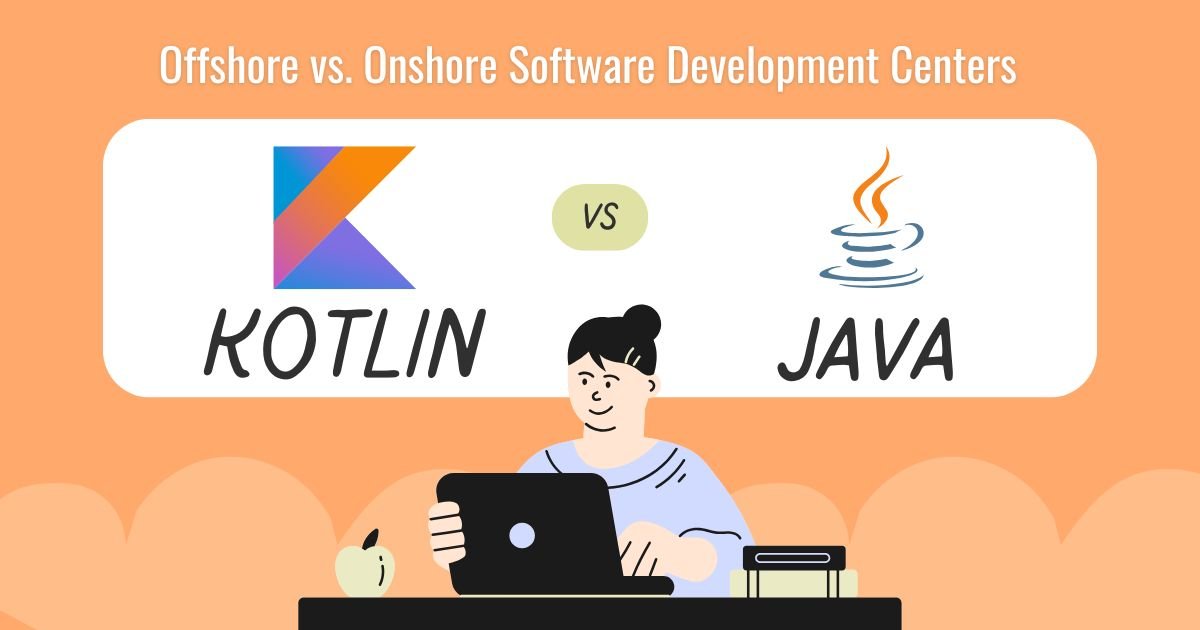In the dynamic world of Android development, choosing the right programming language is crucial for efficiency and app performance. Java and Kotlin are two of the most prominent languages used for Android development today. While Java has been around since the inception of Android, Kotlin is a newer language, officially endorsed by Google as the preferred language for Android development in 2017. In this article, we’ll explore the benefits and limitations of both Java and Kotlin for Android development, helping you decide which language best meets your needs for Android application development services.
A Quick Overview of Java and Kotlin
Java, developed by Sun Microsystems (now owned by Oracle) in the mid-1990s, has been the standard language for Android development for years. Its extensive libraries, community support, and cross-platform capabilities have made it an industry staple.
Kotlin, on the other hand, was created by JetBrains and introduced as a more modern, concise alternative to Java. Google’s endorsement of Kotlin has accelerated its adoption in Android development. It offers many of the same features as Java but with more modern syntax and tools that simplify the coding process.
Comparing Java and Kotlin: Key Aspects
To determine which language is better suited for Android development, let’s compare Kotlin and Java based on specific criteria.
1. Syntax Simplicity and Code Conciseness
- Java: Java syntax can be verbose, often requiring lengthy code to perform simple functions. For example, a basic model class in Java may need several lines of code just to declare variables and get/set methods. This verbosity can result in longer development times.
- Kotlin: Kotlin’s syntax is concise and intuitive. Functions that take several lines in Java can be reduced to one line in Kotlin. This reduced verbosity leads to faster coding and lower chances of errors. For developers or companies looking to hire Java developers, it may be helpful to consider Kotlin for projects with strict time constraints due to its coding efficiency.
Winner: Kotlin – For developers who prioritize concise, readable code, Kotlin offers a more streamlined syntax, making it easier to manage and maintain.
2. Null Safety
- Java: Java’s handling of null values has led to many infamous NullPointerException errors, often requiring additional code for handling null cases. These null checks add to Java’s verbosity and can result in code that is hard to read and maintain.
- Kotlin: Kotlin was designed with built-in null safety. By default, Kotlin does not allow null values, which eliminates the need for null checks in most cases. If a variable needs to be nullable, developers declare it making it easier to manage.
Winner: Kotlin – Its null safety feature reduces the risk of runtime crashes due to null references, ensuring better app stability and user experience.
3. Compatibility with Java
- Java: As the long-established language for Android development, Java has a vast ecosystem, with countless libraries, tools, and resources available. This legacy makes Java highly compatible with Android’s architecture.
- Kotlin: Kotlin is fully interoperable with Java, allowing developers to use Java libraries and frameworks within Kotlin code. This compatibility makes it easier to gradually transition an existing Java-based Android application to Kotlin.
Winner: Tie – Both Java and Kotlin work well within Android, making either language a good choice based on your project’s needs.
4. Performance
- Java: Java is fast and efficient, especially for memory management. The Android Runtime (ART) is optimized for Java, allowing applications written in Java to perform well on Android devices.
- Kotlin: Kotlin’s performance is comparable to Java’s but may lag in certain scenarios. For instance, if your project includes complex computations or resource-intensive tasks, Java might slightly outperform Kotlin due to ART’s optimization for Java.
Winner: Java – While Kotlin is competitive, Java may have an edge in scenarios demanding maximum performance.
5. Community Support and Resources
- Java: Java has been around for over two decades, resulting in a vast community of developers, forums, and online resources. New Android developers can find extensive documentation, tutorials, and solutions for Java-based development challenges.
- Kotlin: Despite being relatively new, Kotlin’s popularity is rapidly growing. The community around Kotlin is expanding, and Google’s endorsement has led to an increase in learning resources. However, the Java community remains significantly larger.
Winner: Java – Its long-standing presence ensures ample community support, which can be invaluable for complex development projects.
Also More: why Kotlin is becoming the preferred choice for Android app development.
6. Development Time and Efficiency
- Java: Due to its verbosity, Java can take longer to code, especially for complex Android applications. Debugging and maintenance can also become challenging, affecting overall development time.
- Kotlin: Kotlin’s concise syntax speeds up the coding process, reducing development time and enhancing productivity. This efficiency is one reason many companies providing Android application development services have embraced Kotlin for faster project turnaround times.
Winner: Kotlin – For faster development and improved efficiency, Kotlin is generally the better choice.
When to Choose Java
Despite Kotlin’s advantages, Java is still a suitable choice for many projects, especially when:
- Legacy Systems Are Involved: For companies with existing Java-based systems, continuing with Java for new projects can ensure compatibility and reduce transition costs.
- High-Performance Apps Are Needed: If your Android app requires intensive computing, Java’s optimization within ART makes it the ideal choice for maximizing performance.
- Large Teams Are Involved: Since Java has a larger community, finding experienced Java developers is relatively easier. Many companies choose to hire Java developers because of the language’s robustness and extensive resource availability.
When to Choose Kotlin
Kotlin may be the better choice if:
- You Value Concise Code: Kotlin’s concise syntax reduces errors and simplifies the development process, making it ideal for time-sensitive projects.
- Null Safety is a Priority: For projects where app stability and crash prevention are essential, Kotlin’s built-in null safety adds significant value.
- You’re Adopting New Technologies: For businesses embracing Android’s latest frameworks and libraries, Kotlin is often the recommended language due to its modern design.
Industry Statistics on Kotlin and Java Adoption
According to a recent Stack Overflow Developer Survey, Kotlin ranks among the most loved languages, with a high satisfaction rate among developers working in mobile development. Meanwhile, Java remains one of the most widely used languages, especially within large organizations, due to its stability and community support.
Additionally, Google reports that over 70% of Android developers now use Kotlin, indicating a substantial shift towards Kotlin in the Android ecosystem.
Final Verdict: Which Language Should You Choose?
Choosing between Java and Kotlin depends on your specific business needs, app requirements, and development resources. Java offers a robust, high-performance solution for long-term projects and complex applications. However, Kotlin’s concise syntax, null safety, and modern features make it the preferred choice for most new Android applications.
Many Android application development services now recommend Kotlin for projects aiming for faster development cycles and enhanced app stability. If your organization is transitioning from Java to Kotlin, consider starting with smaller modules to facilitate a smoother transition.
For expert guidance in building Android applications, you may also want to consider hiring dedicated developers through professional services. Many companies, including those offering Android application development services, can help you navigate the transition to Kotlin while ensuring compatibility with existing Java-based systems.
In conclusion, both Java and Kotlin have valuable roles in Android development. By assessing your project needs and understanding the benefits each language offers, you can make an informed decision that aligns with your business objectives.













Leave a Reply